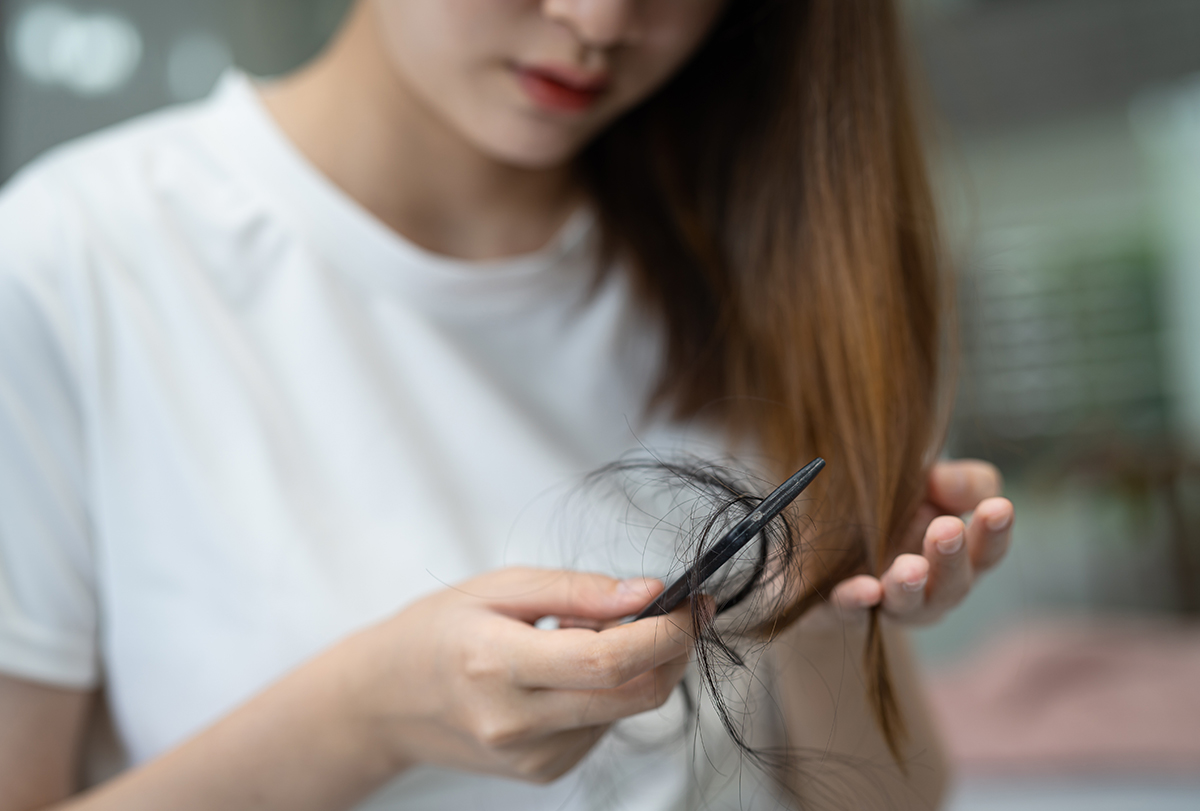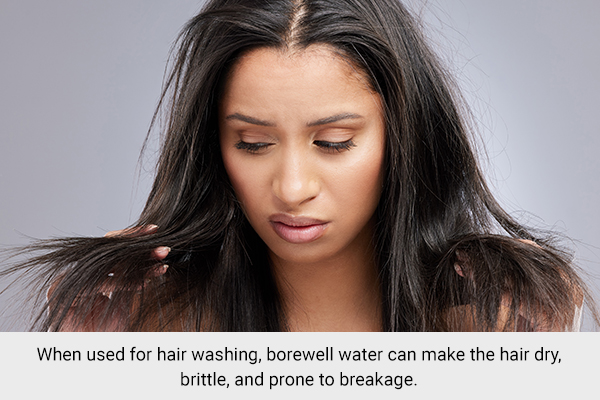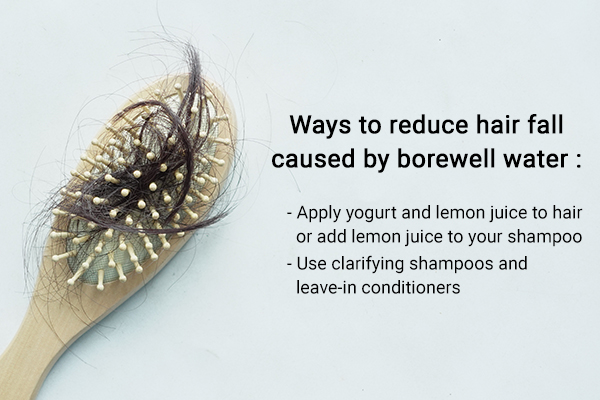In this article:
Borewell water, often termed hard water, is a type of water that has a very high mineral content and can potentially play a role in hair fall.

The presence of minerals such as calcium and magnesium in hard water (1) can make your hair dry and weak. (2) Over time, continuous exposure to hard water may lead to hair damage and even contribute to hair loss if not addressed properly.
However, the scientific community remains divided on the direct impact of hard water on hair. (2)(3)
Some researchers claim that hard water weakens and alters the appearance of hair. (2)(3) The minerals can make the hair lose its bright color and natural shine. If you have dyed your hair, it’s even more vulnerable to these minerals, and they can make the color fade quickly. (4)
However, a study also found that hard water does not necessarily affect hair’s strength or elasticity. Unfortunately, the study’s small sample size (15 volunteers) and the short study duration of 30 days might not have fully captured the long-term effects of hard water on hair health. (3)
Furthermore, this study did not consider hair cleaning products, which may interact with hard water and may not be good for hair health. (5)
So, yes, in certain cases, using borewell water on the hair may indeed be a contributing factor to hair fall because of the minerals found in it that have the potential to compromise hair health, even though a direct connection with hair fall is not firmly established. (2)
This article will explore the relationship between borewell water and hair fall and the scientific evidence behind it.
The Relationship Between Borewell Water and Hair Fall
Borewell water, commonly used in many parts of the world, especially rural areas, is drawn from deep underground through drilling. This water is considered “hard” due to its high mineral content, including sodium, calcium, bicarbonate, and potassium, making it temporarily hard, according to a study. (1)(6)
Note: Temporary hardness refers to the presence of dissolved calcium and magnesium bicarbonates in water, which can be removed by boiling. On the other hand, permanent hardness refers to the presence of calcium and magnesium sulfates, which cannot be removed by boiling. (3)
Although some level of hardness is expected from groundwater, a mineral content exceeding the permissible limit by a lot can make it very unfit for domestic use. Researchers have found many samples of underground water not suitable for use because of the incredibly high values of minerals in them. (1)
Here’s a table showing the permissible and actual amount of minerals that may be present in borewell water –
| Mineral | Permissible limit (mg/L) | Amount found (mg/L) |
|---|---|---|
| Sodium | 150 | 2.8–225 |
| Potassium | 12 | 0.7–145 |
| Calcium | 200 | 3–314 |
Water with an incredibly high mineral content can be bad for your hair and can play some role in hair loss. It can have the following effects on hair.
Decreases hair strength

When used for hair washing, borewell water can make the hair dry, brittle, and prone to breakage. This was confirmed by a study that found that when men’s hair was treated with hard water, the strength of their hair decreased significantly. (2)
Note: Since the research was performed on males, these results may differ for women and may also vary based on the level of water hardness and sample size. (2)
Decreases hair thickness
When comparing the effects of hard water and distilled water on hair, a study discovered that hard water caused more mineral deposition on the hair and reduced the thickness of the hair compared to distilled water.
The surface of hard water-treated hair appeared ruffled, indicating the negative impact of hard water such as borewell water on hair. (7)
Additionally, the minerals in hard water can react with the shampoo and other hair care products, forming a layer of residue on the hair. This residue can make the hair look dull, lifeless, and prone to tangling.
Causes hair dryness and contributes to skin problems
Research has indicated that hard water, due to its mineral content, can react with soaps, leading to the formation of a scum-like substance that may block pores. This could result in various skin issues such as dryness, eczema, and dandruff.
Additionally, consuming hard water might contribute to dry and damaged hair. Over time, this increased hair vulnerability could potentially contribute to hair fall. (8)
Ways to Reduce Hair Fall Caused by Borewell Water
While it may be difficult to completely avoid using borewell water for hair wash, there are several ways to reduce the hair fall caused by borewell water.

1. Apply yogurt and lemon to hair or add lemon to your shampoo
Researchers suggest that to protect your hair from the harmful effects of borewell water, you can add acids such as citric acid (from lemons) to your shampoo and conditioner.
Topical application of yogurt and lemon can also be helpful, as they contain lactic acid and ascorbic acid, which can reduce the damage caused by metal ions on the hair. (2)
Mix 1 tbsp of lemon juice into the ¼ cup of yogurt to make a hair mask. Apply the mask to your hair. Wait for about an hour, rinse it off, and then continue with your regular hair care routine.
2. Use clarifying shampoos and leave-in conditioners
Another way to reduce hair fall is to use a clarifying shampoo. Clarifying shampoos are designed to remove the buildup of minerals and salts on the hair, leaving it clean and refreshed. Using a leave-in conditioner can also help to reduce hair fall.
Leave-in conditioners help to moisturize and nourish the hair, making it less prone to breakage and hair fall.
Most-Asked Questions
Can using borewell water for hair wash lead to hair fall?
Yes, borewell water is hard and has a high concentration of minerals and salts, which can damage the hair and lead to hair fall in some cases.
What other factors can contribute to hair fall?
According to dermatologists, other factors that can contribute to hair fall are stress, hormonal changes, genetics, and nutritional deficiencies.
Is using borewell water safe for other purposes?
Borewell water can be safe for other purposes such as washing clothes or dishes. However, without proper treatment and testing, it is not recommended for drinking or cooking purposes.
Final Word
There is scientific evidence to suggest that borewell water can contribute to hair fall. The high mineral content in borewell water can damage the hair shaft, leading to dryness, breakage, and hair fall.
While it may be difficult to completely avoid using borewell water for hair washing, there are several ways to reduce the hair fall caused by it, such as using clarifying shampoos and leave-in conditioners.
- Was this article helpful?
- YES, THANKS!NOT REALLY


